Investigating autistic presence and expression on film and TV. We push beyond the obvious and seek out autistic themes and concerns in films from across the cinematic spectrum. We consider the ethics of performing autism, while also celebrating the autistic pleasures offered by the camerawork and the soundscapes. We delve into the works of cult directors who have hit upon an autistic way-of-seeing, perhaps without ever intending to. We entertain new possibilites for re-thinking beloved films in a neurodivergent light. Join regular contributors Janet Harbord, Georgia Bradburn, John-James Laidlow, David Hartley and Alex Widdowson for their fascinating and diverting discussions of a whole suite of suprising and challenging films. This podcast is brought to you by the Autism Through Cinema project, based at Queen Mary, University of London and funded by the Wellcome Trust. For further information on the wider project, visit our website at autism-through-cinema.org.uk and follow us ...
Episodes
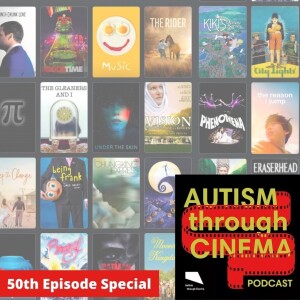
Friday Oct 06, 2023
50th Episode Special
Friday Oct 06, 2023
Friday Oct 06, 2023
We have arrived at our final episode as the 'Autism Through Cinema' podcast.
This is also our 50th episode, so all six of the regular hosts have gathered to look back on the work we have done over the past few years. Each host picks a favourite episode and offers their thoughts, before we join back together to reflect on the medium of podcasting as an academic pursuit.
Here are the direct links to the episodes discussed by each host:
Georgia: Punch-Drunk Love
Ethan: Cat People
Janet: Orlando
Alex: Asylum
Lillian: Amelie
David: Cars
We are hopeful that in some regard some of us may well be able to return to podcasting about the ongoing connections between autism and film, but for now we will say goodbye and thank you so very much for listening.
And huge special thank you also to all who have been involved in the making of this podcast, including our former host John-James Laidlow, all our wonderful special guests, and our editors Benjamin Leverett-Jaques and 344 Audio.
And final thanks to you, our listeners, for your downloads, streams, and support over the past few years.
Here's to a bright autistic cinematic future!

Friday Sep 29, 2023
The Revenant (2015) dir. Alejandro González Iñárritu
Friday Sep 29, 2023
Friday Sep 29, 2023
A huge welcome today to our final special guest, the wonderful Alex Gregson. Alex is Head of Audio at 344 Audio, and has led on the edits of the last eight episodes of our podcast, for which we are eternal grateful. He is newly diagnosed as autistic and reflects very thoughtfully on how his autism has contributed positively to his career as a sound engineer and audio editor.
For our analysis, Alex brings along Alejandro González Iñárritu's Academy Award winning 2015 revenge thriller The Revenant, and asks David and Lillian to pay particular attention to the rich soundscape of the film. We discuss the careful detailing of the sound design, as well as Iñárritu's concoction of a 'cacajanga' soundscape. We find autistic resonance in the meticulous attention paid to the layering of the natural sounds of the wild landscapes, as well as the precise choices made in the levels of balance between sound effects, score and dialogue.
We move on the reflect on some of the challenges faced by neurodivergent individuals who are sensitive to sound, and consider how filmmakers might rethink their approach to final mix of a movie to better accommodate those who might struggle with such sensory input.
A huge thanks again to Alex for joining us, and for doing such a brilliant job of editing our latest batch of episodes. For more on the work that 344 Audio do, you can visit their website here: https://www.344audio.com/
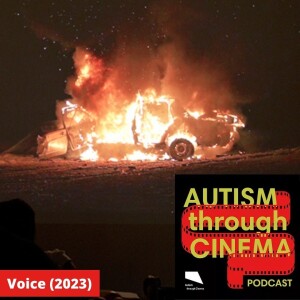
Friday Sep 22, 2023
Voice (2023) dir. Ana Hjort Guttu
Friday Sep 22, 2023
Friday Sep 22, 2023
In this rather exclusive episode, Alex, Ethan, & David take a look at an as yet unreleased film called 'Voice', directed by Norwegian director Ana Hjort Guttu. A documentary maker from Norwegian TV meets resistance when she contacts a group of filmmaking activists to tell a story that is not her own. 'Voice' is a fascinating look at documentary ethics which gives us a springboard to talk about the issues we might need to consider when the subjects of our non-fiction films are not from our own neurotype. Here's the IMDB entry: https://www.imdb.com/title/tt27035082/
We soon move to talking about some of the best and worst offerings of recent documentaries about autism, including the BBC's 'Paddy and Christine McGuinness: Our Family and Autism' and 'Christine McGuinness: Unmasking my Autism'. We also look at 'Chris Packham: Inside Our Minds', 'I Am Greta', and 'I Think We're Alone Now', as well as Alex's own work 'Drawing on Autism'.
We also give a quick shout out to a wonderful radical left comedy podcast Mandatory Redistribution Party, as hosted by neurodivergent hosts Jack Evans and Sean Morley. You can find Mandos here: https://mandatoryredistributionparty.podbean.com/
Thank you for listening!
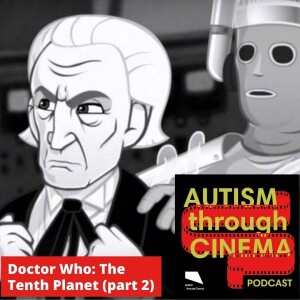
Friday Sep 15, 2023
Doctor Who: The Tenth Planet (1966) dir. Derek Martinus (Part Two)
Friday Sep 15, 2023
Friday Sep 15, 2023
Part two of our special double episode about the wondrous Doctor Who. Harry Draper is still with us, and we spend some time talking through his brilliant contribution to the world of Who audio stories, his TARDIS-focused tale 'The Last Day at Work', which is available here: https://www.bigfinish.com/releases/v/doctor-who-short-trips-the-last-day-at-work-1917
We also engage in a fascinating discussion about the joys and perils of autistic tendencies towards extreme fandom, such as the collecting of merchandise, fan socialising, and the deep knowledge of lore. We question to what extent media corporations have a responsibility to consider how far they may be exploiting autistic fans from excessive merchandising and extended universes. We further consider how such fandoms have in turn created certain mythologies about autism itself, especially in relation to gender.
Important final charitable note!: Harry has asked us to share the fundraising page for the British Heart Foundation, created in memory of Big Finish legend Paul Spragg. If you can spare any money, please donate here:
https://www.justgiving.com/fundraising/big-finish-paul-spragg
Thank you for listening, and be safe out there in the big wide world of all of time and space!
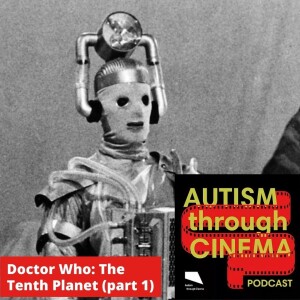
Thursday Sep 14, 2023
Doctor Who: The Tenth Planet (1966) dir. by Derek Martinus (Part One)
Thursday Sep 14, 2023
Thursday Sep 14, 2023
We are officially bigger on the inside... Turns out we don't just cover 'cinema', we may occasionally warp our way onto the TV screen if we feel sufficiently compelled. And what could be more compelling than The Timelord themselves?
It's Doctor Who time (timey-wimey?). Specifically, we focus our sonic screwdrivers onto the second serial of the fourth series of classic Who: 'The Tenth Planet'. This serial is notable for two reasons: the first appearance of the now iconic Cybermen, and the first time the Doctor dies and regenerates.
We are joined by extraordinary special guest, the completely excellent Harry Draper, who is a certified Big Finish Doctor Who audio story author who created the rather marvellous tale 'The Last Day at Work'. Find Harry's audio story here, downloadable for free: https://www.bigfinish.com/releases/v/doctor-who-short-trips-the-last-day-at-work-1917
There was so much to pack in that we decided to split the episode into two parts for your listening pleasure. Part two will be released tomorrow, but for now enjoy our initial discussions! We reflect on the performative values of the cybermen, the presence of female characters and female fans, and our personal histories with this most magnificent titan of British TV.
Tune in again tomorrow for Part 2!
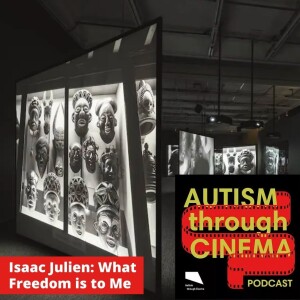
Friday Sep 08, 2023
Isaac Julien: What Freedom is to Me (2023), TATE Britain Exhibition.
Friday Sep 08, 2023
Friday Sep 08, 2023
Here at Autism Through Cinema we've always been interested in how film stretches beyond the traditional cinematic space, and how cinema appears in other contexts. With this in mind, Lillian asked Georgia and Janet to indulge in a trip to TATE Britain to take in the multi-screen spectacle of 'What Freedom is to Me', a retrospective of the work of New Queer filmmaker Isaac Julien.
The trio reflect on the freedoms that are afforded to neurodivergent viewers when not confined by the temporal and spatial limits of the cinema auditorium, as well as the social conventions inscribed in those spaces. Julien's work is considered in relation to its black and queer history, and a critical eye is turned towards the use of beauty to depict difficult subject matter.
The use of multiple screens and the freedom to wander in a gallery allow for further reflections on neurodivegent lives; from the 'rules' around how to look at certain things, to the sometimes strained interactions with other gallery visitors.
Sadly, the exhibition has now closed, but more on Isaac Julien's work can be found via his website: https://www.isaacjulien.com/
Thanks for listening.
Episode edited by 344 Audio.
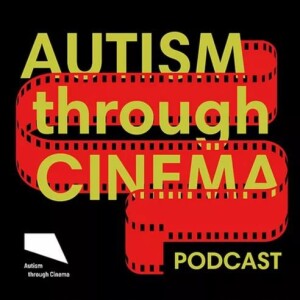
Wednesday Sep 06, 2023
Live Event Preview: Still Lives (2023) at The Garden Cinema
Wednesday Sep 06, 2023
Wednesday Sep 06, 2023
On the 9th September 2023 the ATC podcast team will be appearing live at The Garden Cinema in Covent Garden, London.
There will be a screening of Celine Song’s critically acclaimed debut film ‘Past Lives’ at 14:50 followed by a panel discussion & Q&A with Lillian, Georgia, Ethan and David.
The screening will be a relaxed screening, and tickets can be purchased here: https://www.thegardencinema.co.uk/film/relaxed-screening-past-lives/
Read more about 'Past Lives' in this 5-star review: https://www.theguardian.com/film/2023/sep/06/past-lives-review-a-must-see-story-of-lost-loves-childhood-crushes-and-changing-identities

Friday Sep 01, 2023
Blade Runner (1982) dir. Ridley Scott
Friday Sep 01, 2023
Friday Sep 01, 2023
An episode which has been a long time coming, Georgia, David and Lillian finally tackle the cult classic cyberpunk sci-fi of Ridley Scott's groundbreaking Blade Runner.
There is much to discuss from this 'parable of neurodiversity' (as David puts it), including how the Voight-Kampff test of the film mirrors the real-life 'empathy' tests of autism diagnoses, and how the tag-line 'more human than human' relates to language used to describe (and dehumanise) autistic people.
The gang also consider the status of the cyborg 'replicants' as potential neurodivergent activists, while a special focus on the character of Rachel reveals how the film's cinematography potentially behaves in a neuroqueer manner.
The episode is inspired by David's article on autism and Blade Runner which can be found here if you have the access: https://www.liverpooluniversitypress.co.uk/doi/10.3828/sfftv.2022.12
If not, you can find a version of the article in Chapter 4 of David's PhD thesis, which is available for free (after signing up to Academia.edu) here: https://www.academia.edu/45516790/The_Fantastic_Autistic_Divergence_Estrangement_and_The_Neuroqueer_Screen_in_Blade_Runner_The_Final_Cut_2007_and_Community_2009_2015_
And for even more on the connections between autism and Blade Runner do check out this blog series by SpeakerToAnimals: https://speakertoanimals.wordpress.com/2017/03/27/do-aspies-dream-of-electric-sheep/
Audio edits by 344 Audio.
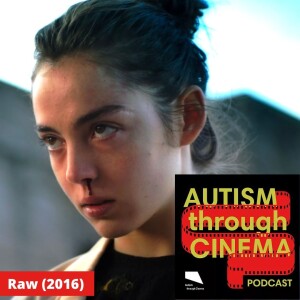
Friday Aug 25, 2023
Raw (2016)
Friday Aug 25, 2023
Friday Aug 25, 2023
With content warnings about discussions around cannibalism, abuse, and eating disorders, Georgia, Janet and Lillian return to tackle the meaty subject of female body horror via Julia Ducournau's grisly debut, Raw. The trio reflect on associations between autism and eating, with particular focus on the processes and difficulties around misophonia, before navigating the tricky relationship of cannibalism and sexuality. There are frank discussions about how norms are undermined in the film, and how acts of masking and gender performance can resonate with autistic female experience. Georgia offers the film as an analogy for the abjection of adolescent life when identities are being formed and rejected, associating this with the turbulence of autistic social navigation.
Lillian's thoughts on Ducournau's second film Titane can be found in Plinth on the following link: https://plinth.uk.com/blogs/magazine/titane-essay-the-horror-of-the-body-in-julia-ducournau-titane
We also welcome our new editors 344 Audio, who will be working hard behind-the-scenes to take us all the way up to our 50th episode.
Many thanks for listening. And please don't be tempted to take a nibble out of your friends...
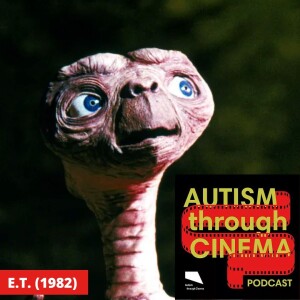
Friday May 12, 2023
ET: The Extra Terrestrial (1982) with Sam Chown-Ahern
Friday May 12, 2023
Friday May 12, 2023
ATC phone home, ATC phone home...!
We're back among the aliens and the spaceships today as we tackle Steven Spielberg's tear-jerking classic. We're also incredibly delighted to welcome yet another wonderful special guest, the brilliant Sam Chown-Ahern! Sam is a filmmaker, artist, collaborator, and member of the Neurocultures Collective, who are currently working with Autism Through Cinema in the creation of an experimental feature film. Sam also presented a wonderfully bizarre re-edit of a scene from ET at the Autism Through Cinema conference in January 2023, and we discuss her motivations behind these artistic choices.
But mostly, we're having a good old chat about a well-beloved film. We find particular interest in the film's navigation of tropes from horror films and family dramas, and we consider Elliot as a figure of loneliness. We also pick up on ET as a film about communication, connecting this with non-normative modes of autistic communication.
Huge thanks to Sam! Check out Sam's work here: https://www.samchown-ahern.com/
